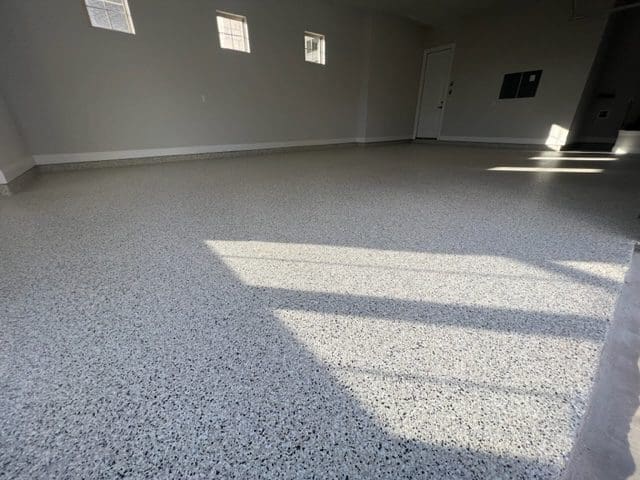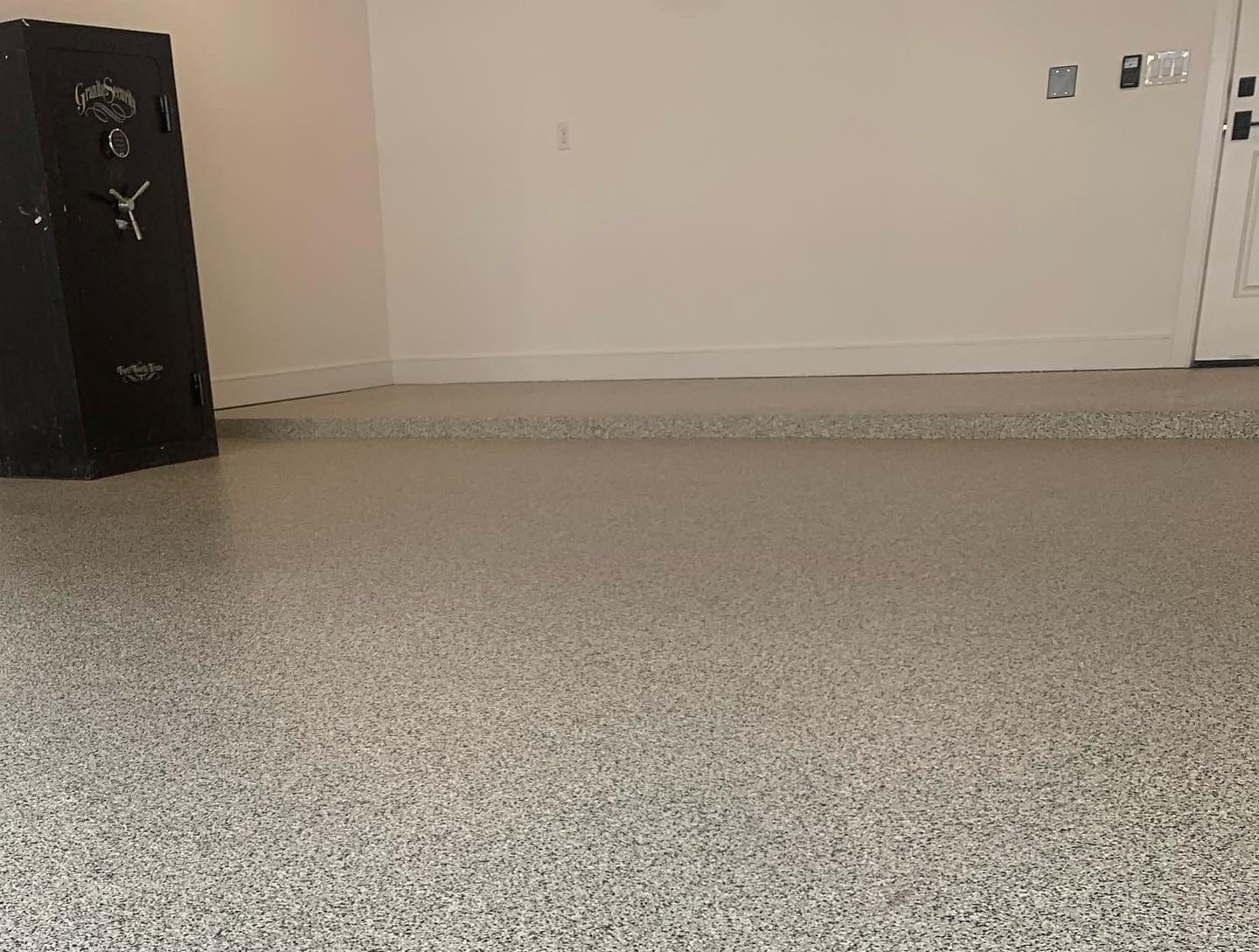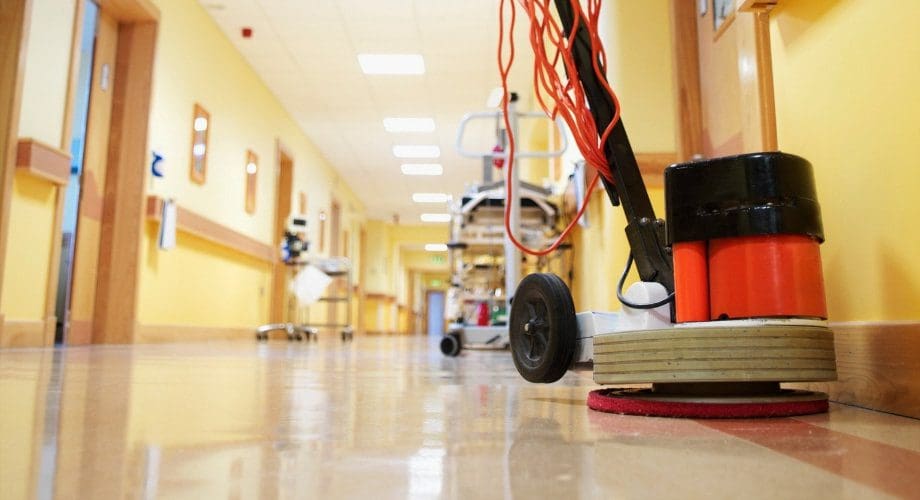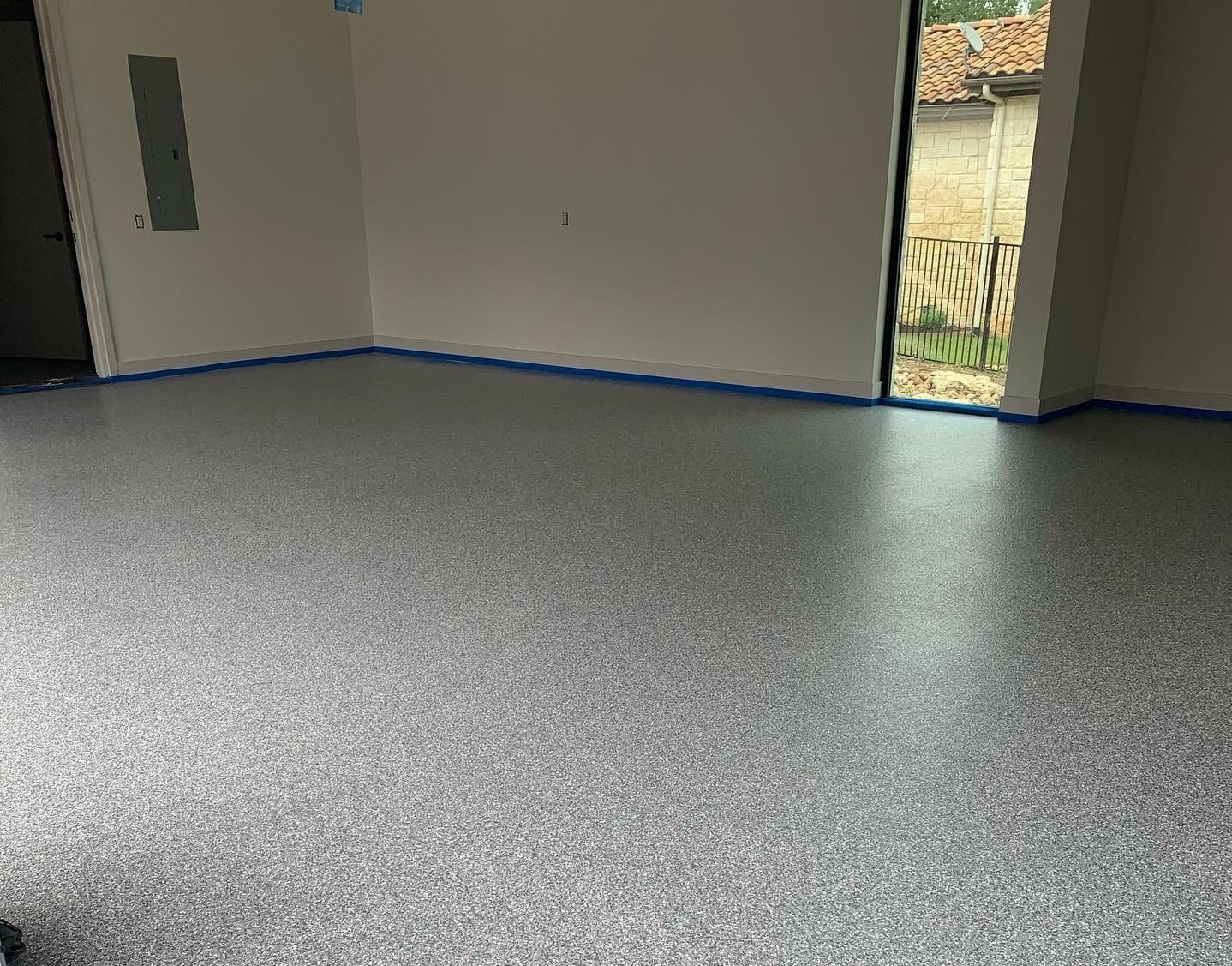Transform Your Garage with an Epoxy Garage Floor Near Me
Service: Concrete Sealing, Epoxy Floor, Featured, Resin Flooring
Transform Your Garage with an Epoxy Garage Floor Near Me
Are you searching for a durable and visually appealing solution to upgrade your garage floor? Look no further than an epoxy garage floor near you. Epoxy coatings provide numerous benefits, including enhanced durability, resistance to stains and chemicals, and a sleek, glossy finish. In this comprehensive guide, we will delve into the process of transforming your garage with an epoxy floor. From understanding the advantages of epoxy to finding reputable contractors near you, we will provide you with the knowledge to make informed decisions and achieve a stunning garage floor that will stand the test of time.
Why Choose an Epoxy Garage Floor?
Schedule ConsultationBenefits of Epoxy Garage Floors
Epoxy garage floors offer a multitude of advantages. They are highly durable, capable of withstanding heavy foot traffic and resisting stains, chemicals, and impacts. The glossy finish adds a touch of elegance to your garage, while the seamless surface makes cleaning a breeze. Additionally, epoxy floors are available in a wide range of colors and designs, allowing you to customize your garage to match your style and preferences. By choosing an epoxy garage floor near you, you are investing in a long-lasting and visually appealing solution.
Finding the Right Epoxy Garage Floor Contractor Near Me


Researching Local Epoxy Flooring Contractors
Finding a reliable and experienced epoxy flooring contractor near you is crucial for a successful installation. This section will guide you through the process of researching and evaluating local contractors. You’ll learn how to check their credentials, read customer reviews, and assess their portfolio to ensure they meet your expectations and requirements.
Questions to Ask Epoxy Flooring Contractors
When contacting potential epoxy flooring contractors, it’s important to ask the right questions to gather relevant information. This section will provide you with a list of essential inquiries, including questions about their experience, certifications, warranties, and estimated timeline. By asking these questions, you can make an informed decision and select a contractor who is the best fit for your project.
1. How long have you been installing epoxy flooring?
Experience is an important factor to consider when hiring an epoxy flooring contractor. Inquire about their years of experience in the industry to gauge their level of expertise and track record. Contractors with extensive experience are likely to have encountered a variety of situations and can handle different project requirements.
2. Are you licensed and insured?
Working with a licensed and insured contractor is essential for your protection. Ask if the contractor holds the necessary licenses and certifications required by your local authorities. Additionally, verify that they carry liability insurance and workers’ compensation coverage. This will safeguard you from any potential liability in case of accidents or property damage during the project.
3. Can you provide references from previous clients?
Requesting references allows you to gain insights into the contractor’s past projects and client satisfaction. Ask for the contact information of previous clients and reach out to them to inquire about their experience working with the contractor. It’s helpful to ask about the quality of work, professionalism, adherence to deadlines, and overall satisfaction with the completed project.
4. What type of epoxy flooring systems do you offer?
Epoxy flooring can come in various systems, such as solid color epoxy, metallic epoxy, or decorative epoxy with flakes or quartz. Inquire about the different options the contractor offers to ensure they can meet your specific aesthetic and functional requirements. Discuss your preferences and ask for samples or photos of their previous installations.
5. Do you provide warranties for your work?
Warranties are an important aspect of any construction project. Ask the contractor about the warranties they offer for their epoxy flooring installations. A reputable contractor should provide warranties for both materials and workmanship. Clarify the duration of the warranties and what is covered, as this will give you peace of mind and protect your investment.
6. What is the estimated timeline for the project?
Understanding the estimated timeline is crucial for planning and managing your project effectively. Ask the contractor about the expected duration of the project, from the preparation phase to the completion of the epoxy flooring installation. This will help you coordinate with other contractors or schedule any necessary disruptions to your daily activities during the installation process.
Asking the right questions when contacting epoxy flooring contractors is vital to gathering relevant information and making an informed decision. By inquiring about their experience, licenses, references, available epoxy flooring systems, warranties, and estimated timeline, you can assess their capabilities and suitability for your project. Remember to take notes during your conversations and compare the answers provided by different contractors. This will help you select the best contractor who aligns with your project goals and delivers high-quality results.
DIY Epoxy Garage Floor Installation Near Me


Assessing Your DIY Skills and Garage Conditions
If you’re considering a DIY epoxy garage floor installation, it’s important to assess your skills and evaluate the condition of your garage. This section will guide you through the process of determining whether a DIY project is suitable for you. You’ll learn how to assess your level of experience, evaluate the complexity of the project, and identify any necessary repairs or preparations required before installation.
1. Evaluate Your Skill Level
Consider your level of experience and expertise in DIY projects, particularly those involving concrete and floor coatings. Installing an epoxy garage floor requires careful preparation, precise application techniques, and attention to detail. Assess your ability to follow instructions, work with tools, and handle potentially hazardous materials. If you’re unfamiliar with epoxy floor coatings or lack confidence in your skills, it may be more suitable to hire a professional contractor.
2. Inspect the Garage Floor
Examine the current condition of your garage floor. Look for cracks, pits, or other forms of damage that may need to be addressed before applying an epoxy coating. Epoxy is a durable and long-lasting material, but it requires a solid and stable substrate for proper adhesion. If your floor has extensive damage or structural issues, it’s recommended to consult a professional to evaluate and address these concerns.
3. Consider the Project’s Complexity
Assess the complexity of the epoxy garage floor installation. Consider factors such as the size of your garage, the layout, and any obstacles or challenging areas. Installing epoxy requires careful planning, surface preparation, mixing and applying the epoxy coating, and applying any desired decorative elements. If your project involves intricate designs or if you have limited experience with similar projects, it may be more efficient and effective to hire a professional who has the necessary expertise and tools.
4. Determine the Required Repairs and Preparations
Identify any necessary repairs or preparations needed before installing the epoxy coating. This may include filling cracks, repairing damaged areas, or addressing moisture issues. Properly preparing the surface is essential for the success and longevity of the epoxy application. Assess your ability to handle these repairs and preparations effectively. If you’re unsure about the required steps or lack the necessary equipment, it’s advisable to seek professional assistance.
Assessing your DIY skills and evaluating the condition of your garage is crucial before undertaking a DIY epoxy garage floor installation. Consider your level of experience, inspect the garage floor for any damage, evaluate the complexity of the project, and determine the required repairs and preparations. If you’re uncertain about any aspect or lack the necessary skills and tools, it’s wise to hire a professional epoxy flooring contractor. They have the expertise, experience, and resources to ensure a successful installation, resulting in a durable and visually appealing epoxy garage floor.
Step-by-Step DIY Epoxy Garage Floor Installation
This step-by-step guide will walk you through the process of installing an epoxy garage floor near you. From surface preparation and priming to applying the epoxy coating and finishing touches, each stage of the installation process will be covered in detail. By following these instructions carefully, you can achieve professional-looking results and transform your garage into a space you can be proud of.
Step-by-Step Guide: Installing an Epoxy Garage Floor Near You
Transforming your garage with an epoxy floor coating is an excellent way to enhance its durability and aesthetics. This step-by-step guide will walk you through the process of installing an epoxy garage floor near you. From surface preparation and priming to applying the epoxy coating and adding finishing touches, each stage of the installation process will be covered in detail. By following these instructions carefully, you can achieve professional-looking results and create a garage space you can be proud of.
Step 1: Gather the Necessary Tools and Materials
Before starting the installation, make sure you have all the tools and materials required for the project. This may include epoxy coating kits, concrete etching solution, a degreaser, a pressure washer, painter’s tape, rollers, brushes, a paint tray, and safety equipment such as gloves and goggles. It’s essential to use high-quality materials to ensure a successful and long-lasting epoxy floor.
Step 2: Prepare the Garage Surface
Surface preparation is a crucial step for a proper epoxy floor installation. Begin by clearing out the garage space and removing any items or furniture. Thoroughly clean the floor using a degreaser and a pressure washer to remove dirt, oil, and other contaminants. For concrete floors, apply a concrete etching solution to create a rough surface that promotes better adhesion of the epoxy coating. Allow the floor to dry completely before proceeding.
Step 3: Prime the Garage Floor
Applying a primer is an important step to enhance the bond between the concrete and the epoxy coating. Follow the instructions provided with your epoxy coating kit to mix and apply the primer. Use a roller or brush to apply the primer evenly across the floor surface. Pay close attention to edges and corners. Allow the primer to cure as per the manufacturer’s instructions before moving on to the next step.
Step 4: Mix and Apply the Epoxy Coating
Prepare the epoxy coating according to the instructions provided by the manufacturer. This usually involves mixing two components. Start by pouring the epoxy mixture onto the floor and spreading it evenly using a roller or brush. Work in small sections to ensure proper coverage. Use a squeegee or a roller with a notch to spread the epoxy into the corners and edges. Continue applying the epoxy coating until the entire garage floor is covered.
Step 5: Add Decorative Elements
If desired, you can add decorative elements to your epoxy garage floor. This may include color flakes, metallic pigments, or quartz crystals. Sprinkle the decorative elements evenly onto the wet epoxy surface while it’s still tacky. Allow the epoxy coating to cure as per the manufacturer’s instructions.
Step 6: Apply a Clear Topcoat
To enhance the durability and longevity of the epoxy floor, it’s recommended to apply a clear topcoat. Mix and apply the topcoat following the manufacturer’s instructions. Use a roller or brush to ensure an even application. The top coat will provide an additional layer of protection and add a glossy finish to the epoxy floor.
By following this step-by-step guide, you can successfully install an epoxy garage floor near you. Remember to gather all the necessary tools and materials, prepare the garage surface properly, apply a primer, mix and apply the epoxy coating, add decorative elements if desired, and finish with a clear topcoat. Take your time during each step to ensure proper coverage and allow the epoxy floor
Maintaining Your Epoxy Garage Floor Near Me


Regular Cleaning and Maintenance
Proper cleaning and maintenance are essential to preserving the beauty and longevity of your epoxy garage floor. This section will provide you with tips and guidelines for regular cleaning routines, including recommended cleaning solutions and techniques. By following these practices, you can keep your epoxy floor looking its best for years to come.
1. Sweep or Vacuum Frequently
Regular sweeping or vacuuming is essential to remove loose dirt, dust, and debris from the surface of your epoxy garage floor. Use a soft-bristle broom or a vacuum cleaner with a brush attachment to sweep the floor thoroughly. This simple step will prevent the accumulation of dirt and help maintain the floor’s appearance.
2. Clean Spills Immediately
Promptly cleaning up spills is crucial to prevent staining and potential damage to your epoxy floor. Wipe up any spills as soon as they occur using a soft cloth or paper towels. For stubborn stains or spills, use a mild detergent mixed with water and a non-abrasive sponge or mop to gently clean the affected area. Avoid using harsh chemicals or abrasive cleaners, as they can damage the epoxy coating.
3. Use the Right Cleaning Solutions
When cleaning your epoxy garage floor, it’s important to use the right cleaning solutions to avoid damaging the surface. Mild detergents, such as dish soap or a pH-neutral floor cleaner, are generally safe for epoxy floors. Dilute the cleaning solution according to the manufacturer’s instructions and mop the floor using a soft mop or microfiber cloth. Rinse the floor thoroughly with clean water to remove any residue.
4. Avoid Harsh Cleaning Tools
To prevent scratches or damage to the epoxy coating, avoid using abrasive cleaning tools such as steel wool or scrub brushes with stiff bristles. Instead, opt for soft brushes, microfiber mops, or gentle cleaning pads. These tools are effective in removing dirt and grime without harming the epoxy surface.
5. Perform Regular Deep Cleaning
In addition to regular sweeping and mopping, it’s beneficial to perform a periodic deep cleaning to maintain the cleanliness and shine of your epoxy floor. This can be done using a rotary floor scrubber or an automatic floor scrubbing machine with a soft brush attachment. Follow the manufacturer’s instructions for the machine and use a mild detergent or epoxy floor cleaner suitable for deep cleaning.
6. Protect the Floor from Heavy Objects
To prevent damage to your epoxy garage floor, use protective mats or pads under heavy objects such as vehicles, tools, or equipment. This will help distribute the weight and minimize the risk of dents or permanent markings. Additionally, avoid dragging or sliding heavy objects directly on the floor, as this can cause scratches or abrasions.
By following these cleaning and maintenance tips, you can keep your epoxy garage floor in excellent condition. Regular sweeping or vacuuming, immediate cleanup of spills, using the right cleaning solutions, avoiding harsh cleaning tools, performing periodic deep cleaning, and protecting the floor from heavy objects are key practices to preserve the beauty and longevity of your epoxy floor. With proper care, your garage floor will continue to impress with its shine and durability for years to come.
Addressing Common Issues and Repairs
While epoxy garage floors are highly durable, occasional issues may arise. This section will address common problems such as scratches, chips, and discoloration, and provide recommended solutions and repair techniques. By addressing these issues promptly, you can maintain the quality and performance of your epoxy floor near you.
1. Scratches
Despite their durability, epoxy floors can develop scratches from heavy objects or sharp tools. To address minor scratches, you can try using fine-grit sandpaper or a non-abrasive pad to gently buff the affected area. If the scratches are deeper, you may need to apply a new coat of epoxy to restore the floor’s smooth appearance.
2. Chips and Cracks
Chips and cracks can occur due to impact or heavy loads. To repair small chips, you can use an epoxy repair kit specifically designed for this purpose. Clean the damaged area, apply the epoxy filler, and smooth it out. For larger cracks, it’s advisable to consult a professional epoxy flooring contractor to assess the extent of the damage and provide the appropriate repair solution.
3. Discoloration
Over time, epoxy floors may experience discoloration due to factors such as UV exposure or chemical spills. To address minor discoloration, you can try using a specialized epoxy floor cleaner or a mild detergent mixed with water. Gently scrub the affected area and rinse thoroughly. For more severe discoloration, it may be necessary to reapply a topcoat of epoxy to restore the floor’s original color and shine.
4. Wear and Tear
With regular use, epoxy floors may exhibit signs of wear and tear, such as dullness or loss of shine. To rejuvenate the floor’s appearance, you can consider applying a fresh coat of epoxy. Properly clean and prepare the floor, and follow the manufacturer’s instructions for applying the epoxy coating. This will not only restore the floor’s aesthetic appeal but also provide an additional layer of protection.
5. Moisture Issues
In some cases, moisture-related issues like bubbling or delamination may occur with epoxy floors. These issues can be caused by underlying moisture problems or inadequate surface preparation. It’s crucial to address the root cause of the moisture issue before attempting repairs. Consulting with a professional epoxy flooring contractor can help identify the source of the problem and provide the appropriate solution.
While epoxy garage floors are highly durable, it’s important to address common issues and repairs to maintain their quality and performance. Scratches, chips, discoloration, wear and tear, and moisture-related problems are common challenges that epoxy floor owners may face. By following the recommended solutions and repair techniques, you can effectively address these issues and keep your epoxy floor near you in excellent condition. Remember, when in doubt or dealing with significant damage, it’s always best to consult with a professional epoxy flooring contractor for expert advice and assistance.
In conclusion, an epoxy garage floor near you can transform your garage into a visually appealing and durable space. By understanding the benefits of epoxy, finding the right contractor, or considering a DIY installation, and implementing proper maintenance practices, you can enjoy the advantages of an epoxy floor for years to come. Whether you’re seeking to enhance the aesthetics or increase the functionality of your garage, an epoxy garage floor near you is a fantastic choice. Invest in this long-lasting solution and elevate the look and performance of your garage today.
Free Consultation
Ready to learn more about how AllStar can help you? Take advantage of our free consultation to get the ball rolling.
Get Started
